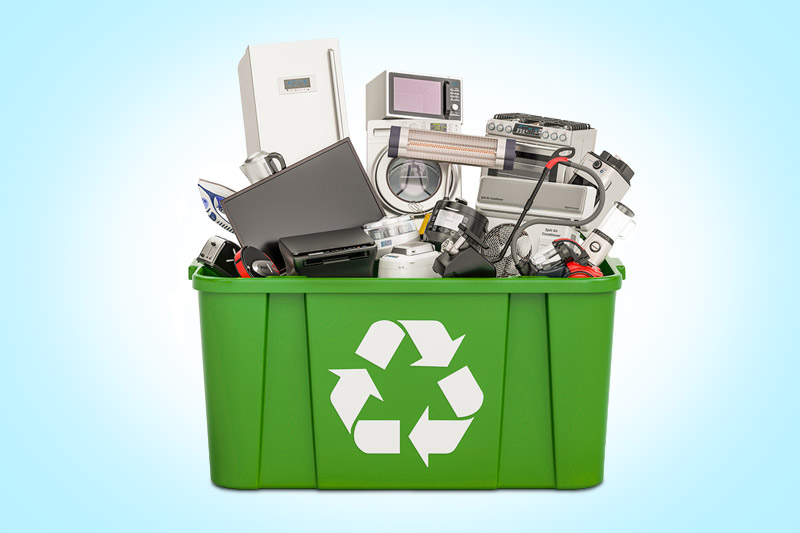Go Eco-friendly with R2 Certification Electronics Recycling Providers: Prioritize the Earth
Go Eco-friendly with R2 Certification Electronics Recycling Providers: Prioritize the Earth
Blog Article
Elevate Your E-Waste Monitoring With R2 Certification: a Detailed Summary
One secret approach to elevate e-waste administration techniques is by obtaining R2 certification. By discovering the processes and advantages associated with R2 qualification, a deeper understanding of exactly how it can reinvent e-waste monitoring techniques emerges, losing light on a course in the direction of sustainability and ethical disposal methods.
Relevance of E-Waste Administration

When e-waste is not handled correctly, these harmful materials can leak right into the ecosystem, creating damage to wildlife and possibly entering the food chain, presenting risks to human health and wellness. The improper disposal of e-waste adds to pollution and greenhouse gas discharges, exacerbating climate change and ecological destruction.

Benefits of R2 Certification

First of all, R2 accreditation enhances reputation by showcasing a company's dedication to lasting practices. It guarantees clients, partners, and stakeholders that the business follows strict standards for e-waste administration - r2 certification. This trustworthiness can cause increased trust fund and enhanced relationships with clients that prioritize environmental responsibility
Secondly, R2 accreditation aids minimize risks linked with improper e-waste disposal. By complying with the rigorous standards established forth by the qualification, organizations can decrease the likelihood of information breaches, environmental contamination, and legal consequences. This proactive technique safeguards the company's credibility and decreases potential liabilities.
Finally, R2 accreditation shows a commitment to ecological stewardship - r2 certification. By responsibly managing electronic waste with licensed processes, companies add to the preservation of sources, decrease of air pollution, and promo of a round economic situation. This commitment not just benefits the environment however likewise aligns with evolving customer expectations for lasting business methods
R2 Certification Process Introduction
Having established the benefits of R2 certification in promoting reliability, threat reduction, and ecological stewardship, it is necessary to now describe the comprehensive process included in getting this qualification. The R2 accreditation procedure begins with a thorough review of the company's functional policies and procedures to guarantee compliance with the R2 his comment is here standard. This initial analysis is essential in identifying any type of spaces that need to be dealt with prior to proceeding additionally.
Once the organization's additional resources methods line up with the R2 standard needs, an independent third-party auditor carries out an on-site audit to review the implementation and effectiveness of these techniques. This audit includes a detailed testimonial of paperwork, meetings with team, and physical inspections of facilities to verify compliance.
Following an effective audit, the organization gets a qualification choice based upon the auditor's findings. If approved, the company is granted R2 accreditation, demonstrating its dedication to responsible e-waste management. It is essential to note that maintaining R2 qualification calls for ongoing conformity with the criterion's needs and routine audits to make certain ongoing adherence to ideal techniques in e-waste recycling and disposal.
Trick Standards for R2 Conformity
A crucial aspect of achieving R2 conformity is making sure that all electronic waste (e-waste) processing facilities satisfy rigorous environmental and safety criteria. To adhere to R2 needs, organizations should comply with vital criteria that focus on responsible e-waste management methods. These requirements consist of carrying out a recorded ecological, health, and security management system, ensuring the safe handling of data-containing gadgets, and carrying out detailed downstream due diligence to track the last destination of e-waste products.
In addition, R2 compliance requires the appropriate screening, refurbishment, and recycling of electronic equipment to expand its useful life and lessen ecological effect. Facilities seeking R2 accreditation have to likewise focus on employee health and security by giving necessary training, individual safety tools, and a risk-free functioning setting. Furthermore, maintaining thorough documents of e-waste handling activities and consistently undertaking audits by accredited certifying bodies are vital parts of demonstrating recurring conformity with R2 criteria.
Influences of Sustainable E-Waste Practices
The application of sustainable e-waste practices in conformity with R2 conformity not only makes certain environmental and security criteria are satisfied however additionally dramatically impacts the general lifecycle of electronic items. By sticking to R2 criteria, electronic waste administration processes end up being more effective, lowering the environmental impact of electronic products. Lasting e-waste practices assist in the appropriate disposal of digital elements, ensuring that harmful products are handled properly and do not wind up polluting the setting.
Additionally, sustainable e-waste techniques can add to job development click to read more in the recycling and refurbishment sectors, cultivating financial growth while promoting ecological responsibility. In general, the adoption of lasting e-waste techniques under R2 accreditation offers as an important action in the direction of accomplishing a much more eco lasting electronics market.
Verdict
In final thought, executing appropriate e-waste administration practices is critical for ecological sustainability and resource preservation. R2 certification plays a key role in ensuring responsible handling and disposal of digital waste. By sticking to the strict standards stated by R2 requirements, companies can not just decrease their environmental influence yet likewise contribute to a much more lasting future for generations ahead.
One key approach to boost e-waste monitoring methods is by acquiring R2 certification. By exploring the procedures and advantages connected with R2 certification, a deeper understanding of just how it can transform e-waste administration approaches arises, shedding light on a path in the direction of sustainability and honest disposal techniques.
The R2 certification process begins with a comprehensive evaluation of the organization's functional plans and treatments to make certain compliance with the R2 standard. If authorized, the organization is approved R2 accreditation, showing its commitment to liable e-waste monitoring. Overall, the adoption of sustainable e-waste methods under R2 qualification serves as a crucial action towards achieving an extra eco sustainable electronic devices market.
Report this page